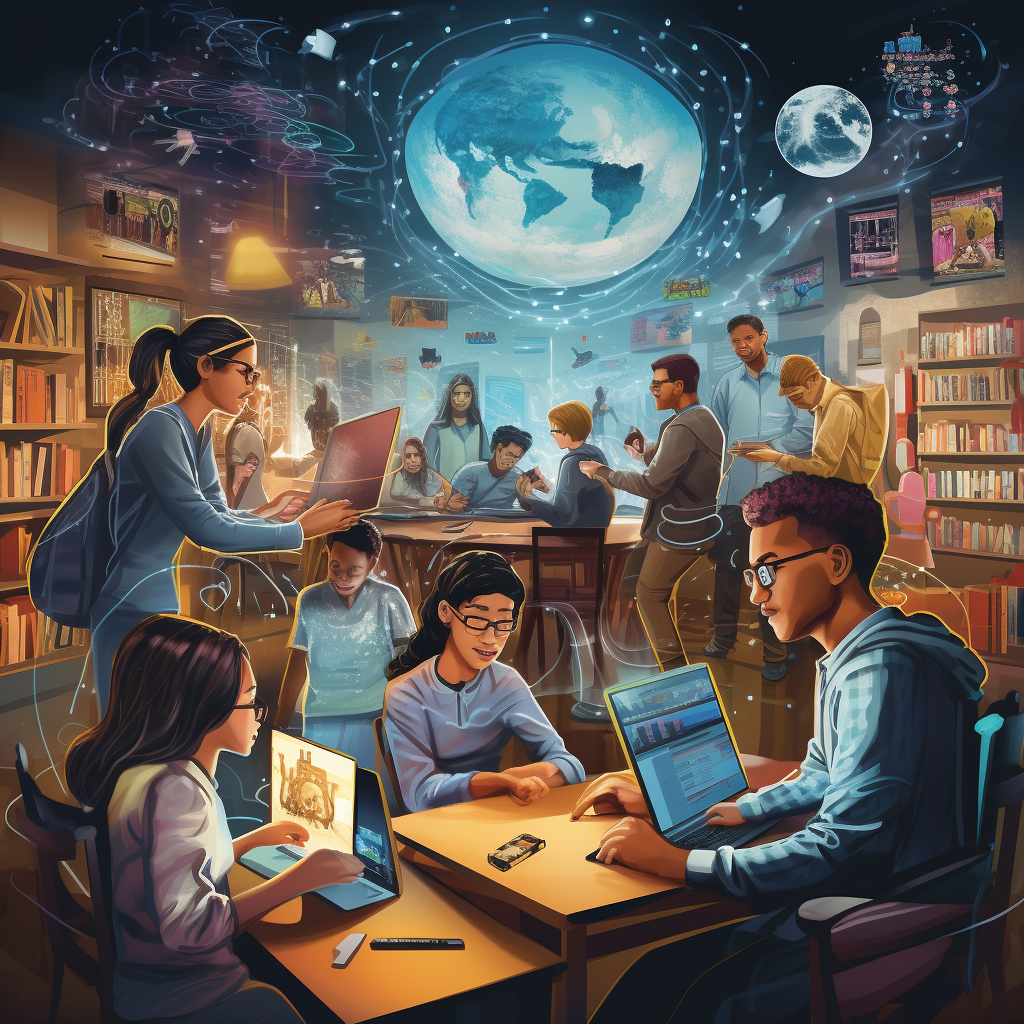How Do Gifted Services Differ From General Education?
Gifted services in education are distinctively designed to meet the advanced learning needs of students who demonstrate high intellectual capabilities. Unlike general education, which follows a standardized curriculum aimed at a broad student population, gifted programs prioritize a personalized learning approach. This ensures that the curriculum is aligned with the individual student's readiness levels, often accelerating or enriching the content to challenge their advanced skills.
At the heart of gifted education is the emphasis on STREAM—an integrated model that expands upon the traditional STEM framework by incorporating Research and the Arts. This holistic approach encourages gifted students to engage in complex problem-solving and creative thinking, facilitating a well-rounded development. Furthermore, social-emotional learning is a key component of gifted services, as it promotes self-awareness and builds the confidence necessary for gifted students to thrive.
For more information or to schedule a tour, email us at gifted@vanguardgiftedacademy.org.
Gifted programs often feature smaller class sizes, which allow for more individualized attention from educators who are specially trained to identify and nurture the unique talents of each child. These teachers employ advanced pedagogical strategies, including differentiation and compacting, to tailor instruction to the needs of gifted learners. The result is an educational experience that not only aligns with their advanced cognitive abilities but also fosters a lifelong passion for learning.
Personalized Learning Approaches for Gifted Students

Personalized learning approaches are the cornerstone of effective gifted education services. Recognizing that gifted students often work at a different pace and depth than their peers, these programs are tailored to match the unique learning profile of each child. Personalized learning strategies may include curriculum compacting, where students demonstrate mastery of a concept quickly and move on to more challenging material, and independent study opportunities that allow students to explore subjects of personal interest at a more advanced level.
Moreover, gifted services utilize flexible grouping, which enables students to work with peers who have similar abilities or interests, fostering an environment where they can be intellectually stimulated and challenged. This approach ensures that students are not held back by a one-size-fits-all curriculum and are instead encouraged to excel at their individual pace.
Differentiated learning is another key method used in gifted education. Teachers adept in gifted services differentiate content, process, product, and learning environment to cater to the various learning styles and preferences of gifted students. This might involve offering more complex texts for reading, incorporating higher-level questioning strategies, or providing opportunities for students to demonstrate their learning through a variety of mediums.
Ultimately, personalized learning approaches in gifted services aim to create a nurturing educational atmosphere that not only meets the academic needs of gifted learners but also supports their emotional and social development, preparing them for success both in and out of the classroom.
Curriculum Enhancement and Acceleration in Gifted Programs
In gifted programs, curriculum enhancement and acceleration are vital to catering to the advanced intellectual capabilities of gifted students. Curriculum enhancement involves the enrichment of the standard curriculum with deeper, more complex concepts and problems. It challenges students to think critically and engage in higher-order thinking. For instance, gifted learners might delve into a regular science topic with additional emphasis on the scientific method or experimental design, allowing them to explore the material more rigorously.
Acceleration, on the other hand, allows students to progress through curriculum at a pace that matches their advanced learning abilities. This may take the form of grade skipping, where a student moves up a grade level, or subject-specific acceleration, where they advance in particular subjects like mathematics or language arts while remaining with their age peers for other classes. The aim is to ensure that gifted students remain engaged and motivated by learning material that is appropriately challenging.
Both enhancement and acceleration are supported by a framework of STREAM (STEM + Research and Arts), which integrates science, technology, research, engineering, arts, and mathematics. This interdisciplinary approach promotes the development of a range of skills, from analytical thinking and creativity to problem-solving and innovation, equipping gifted students with a comprehensive education that surpasses general education standards.
Complementing these strategies, gifted programs often include specialized courses, such as coding, robotics, or advanced literature, which are not typically available in general education settings. These programs are designed to inspire gifted learners, fuel their passions, and provide them with the knowledge and skills needed for future academic and professional success.
Social-Emotional Learning in Gifted Education

Gifted education extends beyond academic needs, recognizing the importance of social-emotional learning (SEL) in the holistic development of gifted children. SEL in gifted programs is tailored to address the unique emotional intensities and sensitivities that many gifted students experience. Programs are designed to foster self-awareness, self-regulation, and interpersonal skills, which are crucial for their well-being and success.
Gifted students often exhibit heightened awareness and strong passions, which can lead to feelings of isolation or frustration when not properly managed. Therefore, SEL curricula in gifted programs aim to help students understand and appreciate their own complex emotions. Educators provide a safe environment where students can learn about empathy, resilience, and the importance of nurturing relationships with peers who have similar abilities and interests.
Moreover, SEL in gifted education often includes opportunities for students to participate in collaborative projects and discussions, where they can practice communication and teamwork. These experiences are invaluable, as they teach gifted learners how to navigate social dynamics and build confidence in their abilities to contribute positively to their community.
The emphasis on SEL also helps gifted students develop a growth mindset, encouraging them to see challenges as opportunities for learning rather than insurmountable obstacles. Through SEL, gifted programs empower students to become self-assured, empathetic individuals capable of leadership and innovation.
The Role of STREAM in Gifted Services

In gifted education, the role of STREAM—an acronym for Science, Technology, Research, Engineering, Arts, and Mathematics—is pivotal in providing a multifaceted and interdisciplinary approach to learning. Unlike traditional general education curriculums, which may focus on rote memorization and standardized testing, STREAM in gifted services emphasizes inquiry-based learning, creativity, and real-world problem-solving.
Gifted services incorporate STREAM to challenge students intellectually and to cater to their advanced learning pace. By integrating these disciplines, students are not only exposed to a breadth of knowledge but also learn how these fields intersect and influence each other. For instance, a lesson on environmental science may include technological tools for data collection, artistic representations of data, mathematical analysis, and engineering solutions for sustainability issues.
The inclusion of Research and Arts in STREAM is particularly significant for gifted learners. Research skills enable students to pursue independent projects and delve deeper into subjects of interest, while the Arts component encourages self-expression, innovation, and the appreciation of aesthetics—areas where gifted students often show exceptional talent.
STREAM curricula are designed to be flexible, allowing for acceleration and enrichment. This adaptability ensures that gifted students remain engaged and motivated, as they are not held back by a one-size-fits-all educational model. Instead, they are encouraged to advance at their own pace, explore complex concepts, and develop a lifelong love for learning.
Navigating the Transition Between Gifted and General Education

Transitioning between gifted and general education can be a critical moment for students who are capable of more advanced coursework. The process requires careful planning and a supportive environment to ensure that gifted learners continue to thrive academically and emotionally. Navigating this transition is a deliberate process that involves recognizing the unique learning styles and needs of gifted students, as well as finding the right balance between challenge and support.
Gifted services often provide a more individualized approach to education, with curricula that are tailored to the student’s strengths and interests. When moving to a general education setting, it is important to maintain this level of personalization as much as possible. Schools and educators can facilitate this by differentiating instruction and offering opportunities for gifted students to continue their advanced studies through honors courses or independent study projects.
Social-emotional factors also play a critical role in the transition. Gifted students may feel out of place or become disengaged if they are not adequately challenged. It is essential for educators and parents to provide a supportive network that encourages these students to express their concerns and aspirations. Regular communication between all parties involved is key to a successful transition.
At Vanguard Gifted Academy, we understand the intricacies of these transitions and are dedicated to offering seamless support. If you are considering the educational path for your gifted child and want to ensure they receive the attention and tailored learning experience they deserve, we invite you to reach out for more information or to schedule a tour. Please email us at gifted@vanguardgiftedacademy.org and take the first step towards a brighter educational future for your child.
